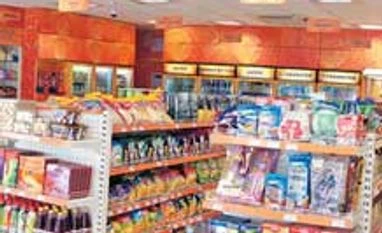Singh says his daily conversations with dealers in these markets suggest all is well. “They tell me they are looking forward to the upcoming festival season, which will kick off in a month and a half. We are putting our inventory and line-up in place for the season.”
Videocon is not the only company that appears relaxed about the scanty rainfall predicted recently by the weather department. Even those like LG, Godrej Appliances, Godrej Consumer, Dabur, Hindustan Unilever and Mahindra & Mahindra have not yet pressed the panic button. The reason is the resilience rural markets now have to a deficient rainfall.
Also Read
Thanks to rural development programmes like the National Rural Employment Guarantee Scheme (NREGS) and better irrigation, unlike earlier, consumers in the hinterland do not have to turn to the rain gods to get their cycle of lives going.
Wages disbursed in the past three years under NREGS were close to Rs 80,000 crore. The scheme covered 290 million workers in 778,000 villages across the country. The new central government has not given any indication it will wind down any of these schemes. In 10 years since 2000, the gross irrigated area in India jumped 17.29 per cent to 89,360 hectares, according to government data (sourced from industry).
With money and water available, it is natural for consumers in the countryside to be relatively relaxed in the face of a weak rainfall. Companies depending on these consumers for sales are not nervous, either.
“We are not at all in panic,” says Dabur India Chief Executive Officer Sunil Duggal. The Ghaziabad-based company is among those with the widest reach in rural areas. It derives 40-45 per cent of its sales from villages, thanks to a sustained campaign of distribution in these markets in the past few years. Duggal says what worries him is agri-input inflation, which could pressure margins. “But I don’t see an impact on the top line.”
On an average, Dabur managed to deliver sales volume growth of nine per cent in every quarter last financial year. That rate is expected to remain intact in the coming quarters as well, despite a sub-normal monsoon.
The trend at other consumer goods companies appears to be no different. Emami Chief Financial Officer Naresh Bhansali says he expects his company to do well in coming quarters, despite a weak monsoon. “The rainfall chain got broken a few years ago. Today, consumers are not dependent on the monsoon alone for their livelihood. This augurs well for companies like ours; we are assured the sales funnel will not dry up,” he says.
Auto companies bullish
Even tractor majors like Mahindra & Mahindra and TAFE are optimistic. “Tractor sales in 2014-15 are unlikely to be affected, despite the El Niño phenomenon causing deficient rainfall. Agriculture is not sensitive to a year of bad monsoon. It gets impacted only if there is low rainfall for more than a year. Besides, the linkage between tractor sales and the monsoon is not strong. We have seen brisk volumes in years when rainfall has been deficient,” says Mahindra & Mahindra Chief Executive (farm equipment and two-wheeler division) Rajesh Jejurikar.
“Industry sales growth was nearly flat in April and May, but there was some improvement in June. We will get a better picture by the end of this month. Earlier, monsoon was one of the biggest drivers of tractor demand. But that changed lately, with new government schemes playing a big role in tractor sales,” said a TAFE executive who did not wish to be named.
RAIN OR SHINE
* Decoupling: Rural development schemes and better irrigation have decoupled rural consumption from the monsoon
* Schemes: Programmes like NREGS are believed to have played a key role in reducing rural households’ dependence on a good monsoon for livelihood
* Rs 80,000 crore: Disbursed as wages under NREGS in the past three years
* 290 million: Number of workers covered by NREGS in 778,000 villages across the country
* 17.29%: The rate at which the country’s gross irrigated area has increased in the 10 years since 2000 (to 89,360 hectares)
)